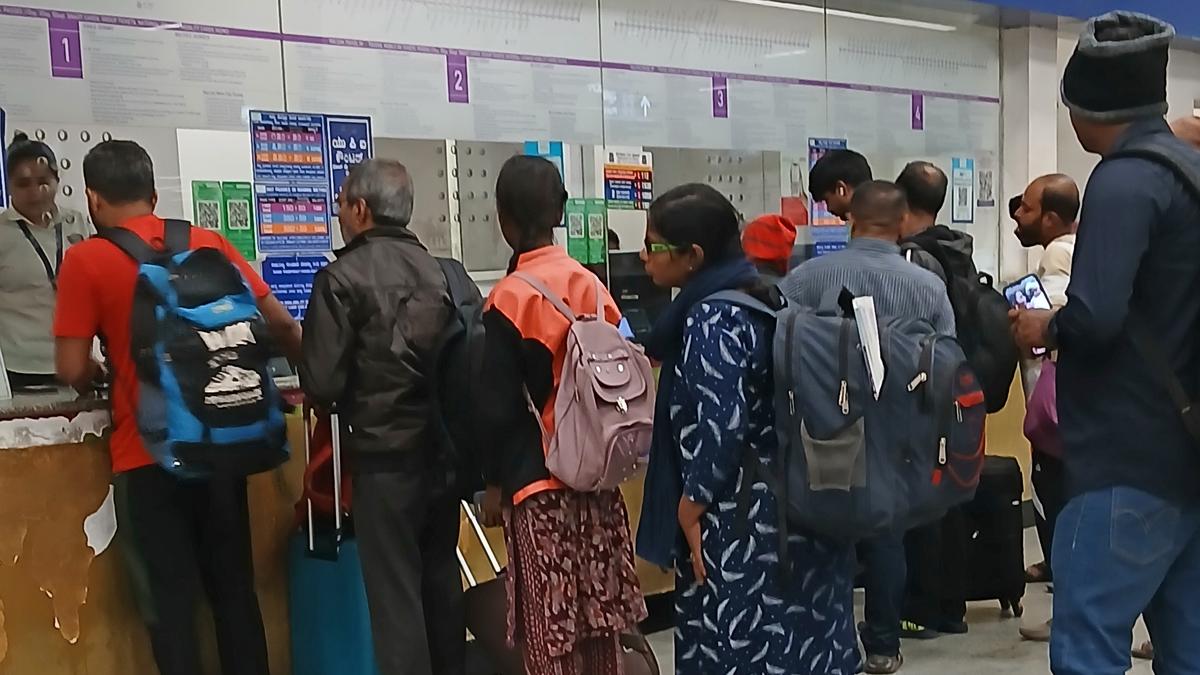With end-to-end fares increasing from ₹120 to ₹180, many are now reconsidering their daily travel choices.
| Photo Credit: file photo
Commuters are expressing growing concerns that the recent hike in Namma Metro fares will push more people to use personal vehicles, exacerbating the city’s already severe traffic congestion.
With end-to-end fares increasing from ₹120 to ₹180, many are now reconsidering their daily travel choices and are opting for shared cabs and autorickshaws, which have become a more economical option for families travelling together, while a few people are choosing their own personal vehicles.
Monika C.G., an engineering student from Hosahalli, shared how the hike had impacted her daily expenses. “Earlier, I used to pay ₹28 for a one-way trip to National College in Jayanagar. Now, I have to pay ₹48, which means my daily travel cost has risen from ₹56 to ₹96 — a staggering 71% increase.”
Bengaluru’s road network spans approximately 14,000 km and accommodates an overwhelming 1.2 crore registered vehicles. The city also has the highest number of registered two-wheelers in India, with 82 lakh vehicles. According to a recent global traffic index for 2024 by Tom Tom, a Dutch location technology firm, Bengaluru’s average duration to traverse 10 km was 30 minutes and 10 seconds.
Traffic may get worse
The increased metro fares are expected to deter some commuters from using public transport, forcing them to rely on personal vehicles or costlier last-mile transport options. “With metro fares going up, many people like me will think twice before using it daily. If this pushes more people toward two-wheelers, we will see traffic getting even worse,” said Prashanth R., a software professional who commutes from Yeshwantpur to Indiranagar daily.
Like other metro cities, Bengaluru does not have a shared autorickshaw system. The inadequate Bengaluru Metropolitan Transport Corporation (BMTC) feeder bus service further limits connectivity options, forcing commuters to depend on expensive autorickshaws, cabs, or bike taxis for their first and last-mile travel. Those using personal vehicles also face parking charges at metro stations, adding to the overall cost of commuting.
The fare increase has sparked public outrage, with many netizens launching the #RevokeMetroFareHike campaign.
Rajkumar Dugar, founder of Citizens for Citizens, strongly criticised the fare hike, calling it a “highly retrograde step” by the government. “The common man is hit very hard. Instead of spending ₹40,000 crore on a 46-km tunnel road project, the government should subsidise all public transport. They claim they want to increase public transport usage, but in reality, they are implementing anti-public transport policies. Brace for even higher congestion on roads,” Mr. Dugar said.
With the latest revision, Bengaluru metro has become the most expensive metro system in India. The maximum fare has increased from ₹60 to ₹90, making it significantly costlier than metro systems in other major cities. Delhi metro charges ₹60 for trips beyond 32 km, while Chennai metro charges ₹50. In Kolkata, the highest fare for distances between 25 and 30 km is just ₹25, lowest in the country.
Scrapping rebates and changes made to smart card policy draws ire
Adding to commuter frustration, BMRCL has scrapped QR code discounts, now limiting the 5% discount only to smart card users. In 2020, BMRCL already reduced the smart card discount from 15% to 5%. Meanwhile, metro systems in Chennai and Kochi continue to offer a 20% discount on smart cards, QR codes, and WhatsApp tickets.
BMRCL has also increased the minimum balance requirement for smart cards from ₹50 to ₹90, making it more expensive for occasional metro users.
“This is nothing but a money grab,” said Sunil K., a daily commuter from Banashankari to Peenya. “They increased fares, reduced discounts, and now even the minimum balance has gone up. Other metros offer better deals to encourage ridership, but here, everything is becoming costlier.”
The fare hike comes just weeks after the Karnataka government raised bus fares by 15% across all four State-run transport corporations, effective from January 5. This double blow to public transport users is expected to have a ripple effect, pushing more people toward private vehicle usage, ultimately worsening Bengaluru’s already dire traffic conditions.
Published – February 10, 2025 09:11 pm IST
